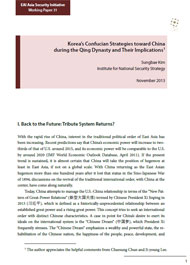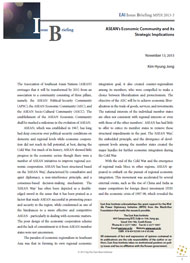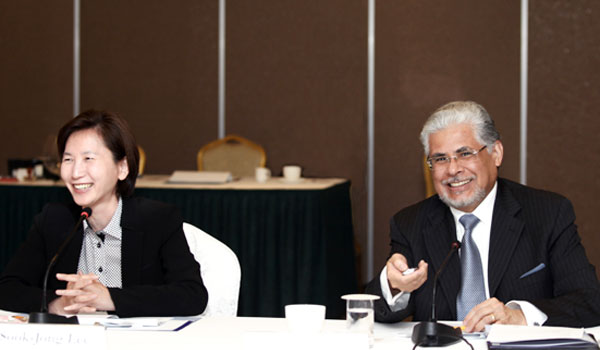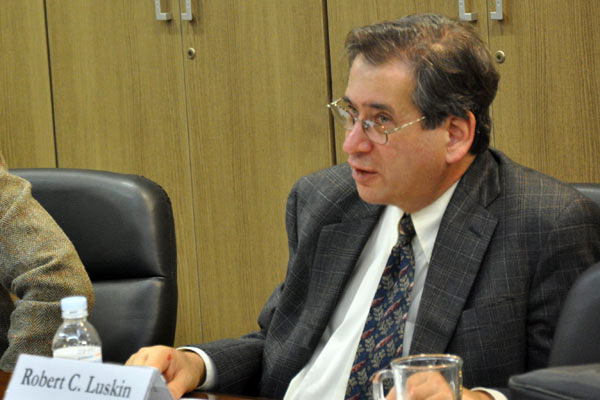 EAI Launches Asia Democracy Research Network in Seoul EAI Launches Asia Democracy Research Network in Seoul |
|
|
From November 25-26, EAI hosted eleven researchers in democracy-issue related think tanks from nine Asian countries in Seoul for the first meeting and workshop in the history of the Asia Democracy Research Network (ADRN). The participants discussed the challenges that remain in democratic transition and consolidation in Asian countries and attempted to realize how the network can play a meaningful role in promoting democracy in Asia. The group focused specifically on the role of think tanks in democracy-related issues and the obstacles that they face in producing beneficial results. Finally, the gathered experts formulated a research agenda for the future of ADRN as a pillar of the Asia Democracy Network through an analysis of individual and pooled research capabilities. 
| | |
|
 |
Chosun Dynasty Policies toward China Compared to Current ROK-PRC Relations in Working Paper
 In this work from the Asia Security Initiative (ASI) series, Sungbae Kim analyzes Korea's traditional Confucian strategies toward China, arguing that the traditional East Asian order was constructed reciprocally by China and its neighbors. He describes how the definition of China was at the core of the East Asian nations' strategic choices. In addition, he highlights that soft power is an essential part of Korea's strategies toward China by drawing lessons from a reinterpretation of Chosun scholars' ideas. In this work from the Asia Security Initiative (ASI) series, Sungbae Kim analyzes Korea's traditional Confucian strategies toward China, arguing that the traditional East Asian order was constructed reciprocally by China and its neighbors. He describes how the definition of China was at the core of the East Asian nations' strategic choices. In addition, he highlights that soft power is an essential part of Korea's strategies toward China by drawing lessons from a reinterpretation of Chosun scholars' ideas. 
|
Issue Briefing on Strategic Implications of ASEAN Economic Community
 Hyung Jong Kim explores the implications of efforts to establish the ASEAN Economic Community (AEC) on regional economic integration in Southeast Asia in this recent publication from the Middle Power Diplomacy Initiative (MPDI) series. With ASEAN at a crossroads as it seeks to develop an integrated community, this briefing reviews pre-AEC initiatives and examines its rationale and strategies, while focusing on the resistance of protectionism against liberalization, political considerations, and the 'ASEAN Way.' Finally, the paper concludes that the AEC arose as an answer to emerging East Asian regionalism and recommends that South Korea must diversify its strategy from bilateralism with superpowers to middle-power networks like the AEC in the future. Hyung Jong Kim explores the implications of efforts to establish the ASEAN Economic Community (AEC) on regional economic integration in Southeast Asia in this recent publication from the Middle Power Diplomacy Initiative (MPDI) series. With ASEAN at a crossroads as it seeks to develop an integrated community, this briefing reviews pre-AEC initiatives and examines its rationale and strategies, while focusing on the resistance of protectionism against liberalization, political considerations, and the 'ASEAN Way.' Finally, the paper concludes that the AEC arose as an answer to emerging East Asian regionalism and recommends that South Korea must diversify its strategy from bilateralism with superpowers to middle-power networks like the AEC in the future. 
|
Commentary on Future Direction of Northeast Asia Peace and Cooperation Initiative
 Sook-Jong Lee examines how the Northeast Asia Peace and Cooperation Initiative directed by the Park Geun-hye administration can help to create a multilateral dialogue that can defuse the region's maritime territorial disputes, rather than to pursue a comprehensive and abstract initiative. The author suggests that instead of using the Initiative to form a regional institution, it would be more effective for Park to use her trust leadership to bring Northeast Asian leaders to sustainable, threat-reducing dialogue. Sook-Jong Lee examines how the Northeast Asia Peace and Cooperation Initiative directed by the Park Geun-hye administration can help to create a multilateral dialogue that can defuse the region's maritime territorial disputes, rather than to pursue a comprehensive and abstract initiative. The author suggests that instead of using the Initiative to form a regional institution, it would be more effective for Park to use her trust leadership to bring Northeast Asian leaders to sustainable, threat-reducing dialogue. 
|
Mexico's Ambassador to South Korea Joins the Fifth Roundtable Discussion for Middle Power Diplomacy
 On October 31, EAI invited H.E. José Luis Bernal Rodrìguez, the Mexican ambassador, to speak at the final roundtable in the series focusing on the future role of middle powers. The ambassador discussed the difficult domestic issues that dictate and constrain Mexico's foreign policy, which was followed by a question-and-answer session that explored the future South Korea-Mexico partnership and prospects of MIKTA, the new middle-power network of nations made up of Mexico, Indonesia, Korea, Turkey, and Australia. On October 31, EAI invited H.E. José Luis Bernal Rodrìguez, the Mexican ambassador, to speak at the final roundtable in the series focusing on the future role of middle powers. The ambassador discussed the difficult domestic issues that dictate and constrain Mexico's foreign policy, which was followed by a question-and-answer session that explored the future South Korea-Mexico partnership and prospects of MIKTA, the new middle-power network of nations made up of Mexico, Indonesia, Korea, Turkey, and Australia. 
|
EAI Named South Korea's Representative for Global Democracy Think Tank Network
The Network of Democracy Research Institutes (NDRI) chose EAI as the representative democracy institute for South Korea in its global network of think tanks dedicated to researching and analyzing democracy and democratization through comparative government and international affairs studies. EAI was featured in the NDRI Spotlight due to its work in identifying social polarization, a cynical public, and stability caused by North Korean threats as key challenges to democracy in South Korea. 
|
Roundtable Discussion on Deliberative Polling
 EAI welcomed Robert C. Luskin, associate professor in the Department of Government at the University of Texas at Austin, to the institute for a talk on deliberative polling with a focus on its design, purpose, challenges, and expectations. In a related field, he also discussed deliberation and its goal of increasing knowledge and respect. EAI welcomed Robert C. Luskin, associate professor in the Department of Government at the University of Texas at Austin, to the institute for a talk on deliberative polling with a focus on its design, purpose, challenges, and expectations. In a related field, he also discussed deliberation and its goal of increasing knowledge and respect. 
|
Eleventh Anniversary Evening Gala Set to Be Held in December
On December 10, EAI will host its Eleventh Anniversary Evening Gala at the Novotel Ambassador Gangnam Hotel. This biannual event will honor the dedication and contributions of EAI's myriad of supporters. It will feature a welcoming address by Young-Sun Ha, the chairman of EAI, followed by congratulatory remarks by the founder and several board members of the institute. There will be several performances by Korean entertainers and magicians after dinner. 
|
Korea Friendship Gala Will Honor Students Next Month
To celebrate the end of the year for the Korea Friendship Program, EAI has planned a gala for the participating students on December 2 at the Lotte Hotel. Certificates and awards will be handed out to the program's members, along with the inaugural ceremony of the Korea Foundation Alumni Association. 
|
#909 Sampoong B/D, Eulji-ro 158, Jung-gu, Seoul 100-786, Republic of Korea
Tel 82 2 2277 1683 | Fax 82 2 2277 1684/1697 | Email EAI | Unsubscribe
Copyright 2013© EAST ASIA INSTITUTE. All Rights Reserved. | |

